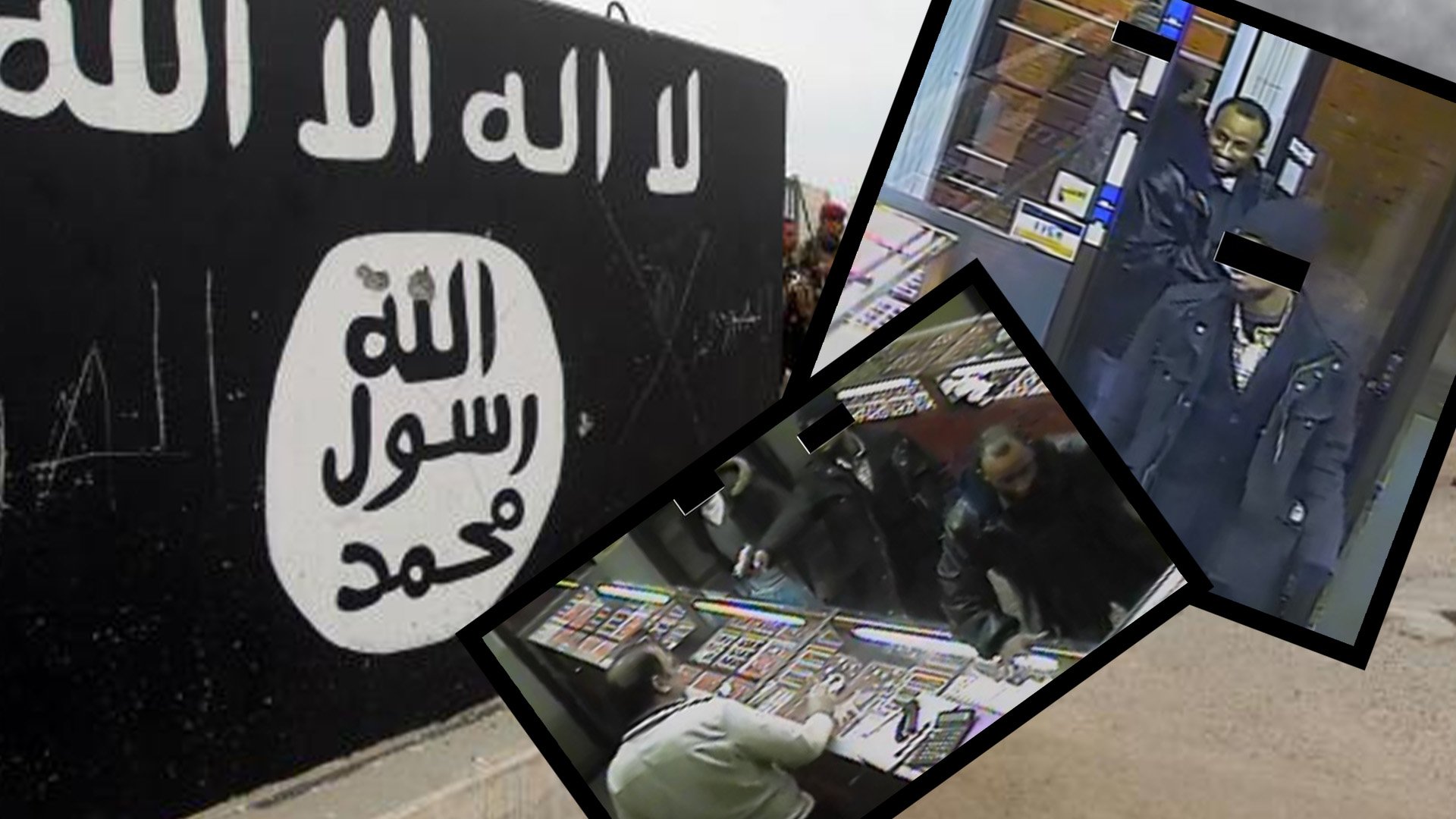
An ex-San Diego resident, Abdullahi Ahmed "Phish" Abdullahi, 37, orchestrated the brazen Jan. 19, 2014, heist of VJ Jewellers in Edmonton, Canada, to help finance flights for volunteers hoping to join Islamist terrorists in Syria. Coffee or Die Magazine composite.
Abdullahi Ahmed “Phish” Abdullahi, the bumbling international gem thief who knocked off a jewelry store to fund ISIS terrorists, will stay behind bars in the US.
In San Diego on Monday, Oct. 17, US District Judge Thomas J. Whelan sentenced the 37-year-old Canadian to two decades in a federal penitentiary for providing material support to Islamic State group terrorists.
Abdullahi inked a plea deal with federal prosecutors 10 days before Christmas that capped his jail time at 20 years. He’s been incarcerated since his extradition from Edmonton in 2017.
His criminal defense attorneys in California declined comment when contacted by Coffee or Die Magazine.
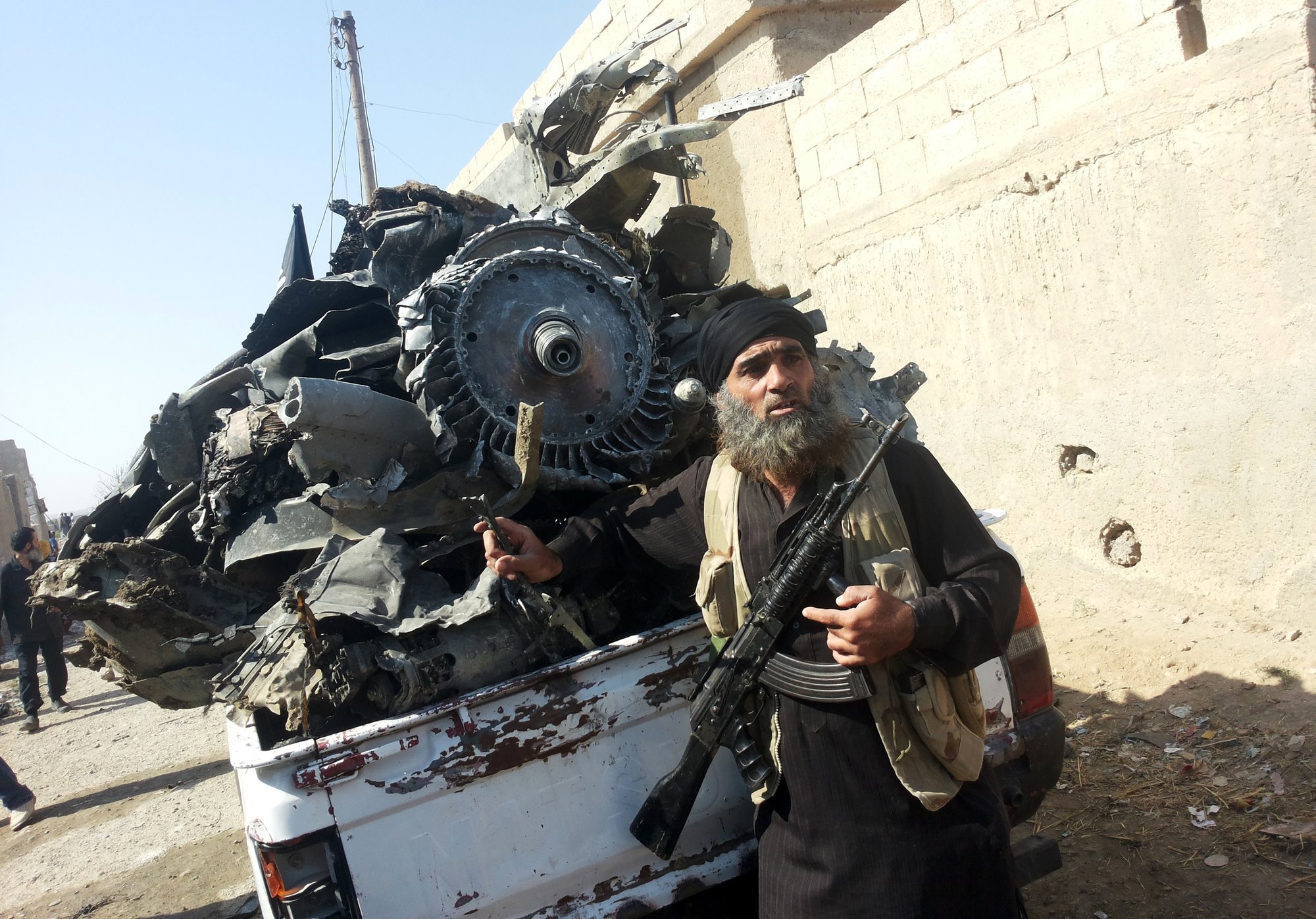
An armed jihadist stands next to the wreckage of a Syrian government forces aircraft which was shot down by militants of the Islamic State (IS) group over the Syrian town of Raqa on September 16, 2014. The plane crashed into a house in the Euphrates Valley city, the sole provincial capital entirely out of Syrian government control, causing deaths and injuries on the ground, Syrian Observatory for Human Rights monitoring group said. AFP PHOTO/RMC/STR (Photo credit should read STR/AFP via Getty Images)
Abdullahi’s case shined a light not only on ISIS radicalization of Somali refugees living and often moving between the US and Canada but also on how members of that community turned in their own relatives.
The probe by US authorities and the Royal Canadian Mounted Police uncovered a conspiracy by a rogue’s gallery of terrorists and their funders known in the files as “Tooth,” “Little Man,” “Farmer,” “Zooman,” “Sleepy,” and their money man, “Phish” Abdullahi, conspirators who called themselves “akhs” operating within a larger and law-abiding Somalia population of “homies in N.A.,” or North America.
Their volunteers jetted in a steady “caravan” from San Diego, Minneapolis, Calgary, and Edmonton to Turkey, crossing the border to join ISIS in Syria. They texted, fired off emails, or took to social media to showcase their battlefield exploits — “skills on da court” — and “three-point shot” sharpshooting when "smashing the manz in ball," their enemies, mostly Free Syrian Army insurgents also fighting the Damascus dictatorship.
They called their firearms "strap” and the money from funders like Abdullahi, "gwap.” When they got “shahada” — slain in Syria as so-called martyrs — the conspirators would say they got “benched” or their foes managed to "sub us out.”
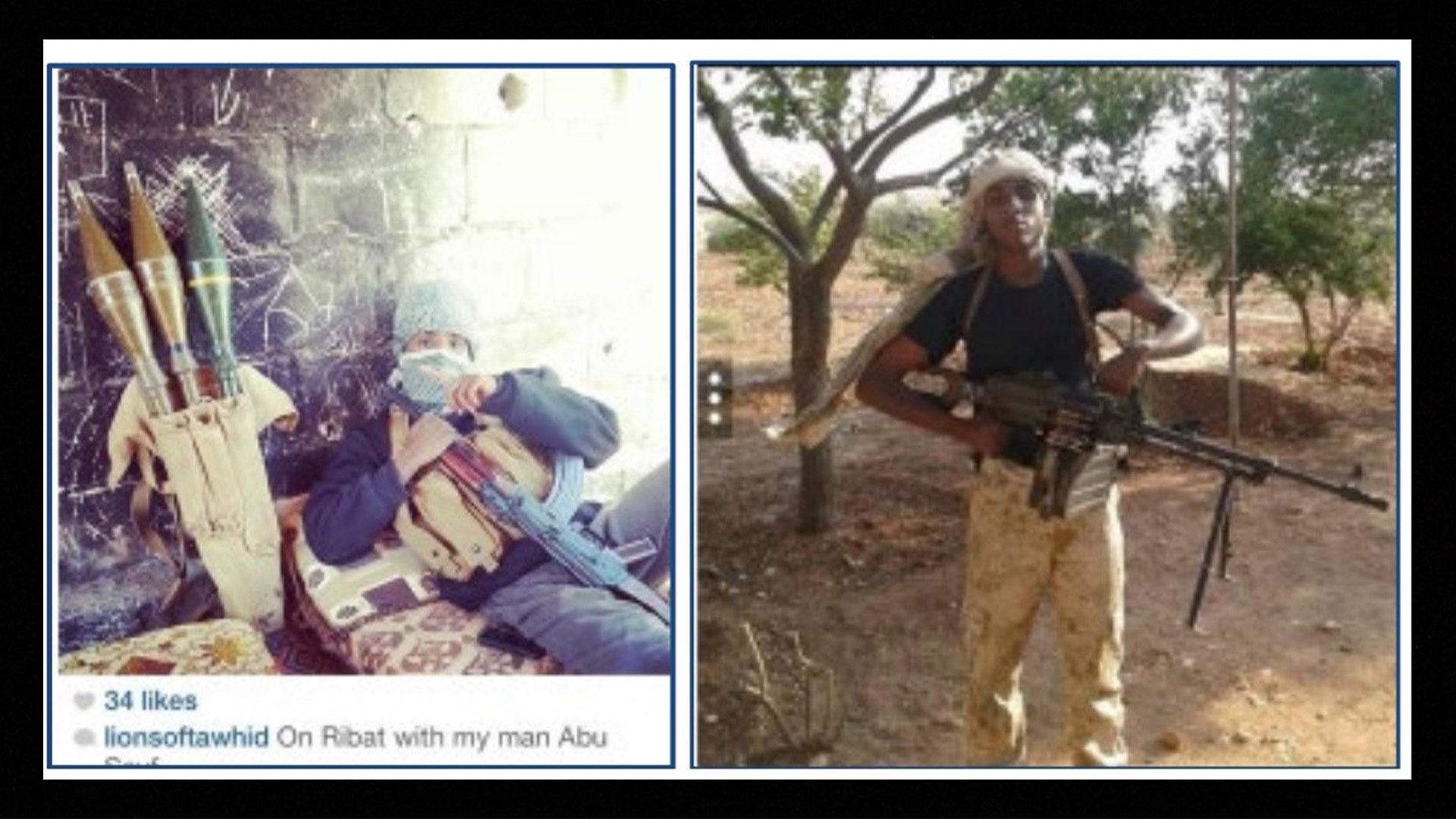
Social media posts captured Hanad Mohallim, who was killed fighting for the Islamic State group in Syria. The 19-year-old Minneapolis man was a cousin of convicted terrorist finanier Abdullahi Ahmed "Phish" Abdullahi, 37. US Department of Justice photo.
At the center of it was Abdullahi, a refugee from war-torn Mogadishu who settled in the US before becoming a naturalized Canadian citizen. Between late 2013 and the end of 2014, he helped send at least six men to Syria to join the Islamic State group and continued to send them funds by wire transfer to Gaziantep, Turkey.
But everyone Phish helped get to Syria died. Four were his cousins: Hamsa Kariye, 30; Hirsi Kariye, 23; Mahad Hirsi, 20; and Hanad Mohallim, a 19-year-old Minneapolis man.
The other two included Douglas McCain, 33, a friend Abdullahi met when he lived in San Diego.
“I wish u the best and inshallah we’ll be all together on the front lines just like I been dreaming about lately,” Phish messaged them. “May allah bless ur hearts and fill it with joy and happiness on the front and may u brothers bring destruction to the cowards.”
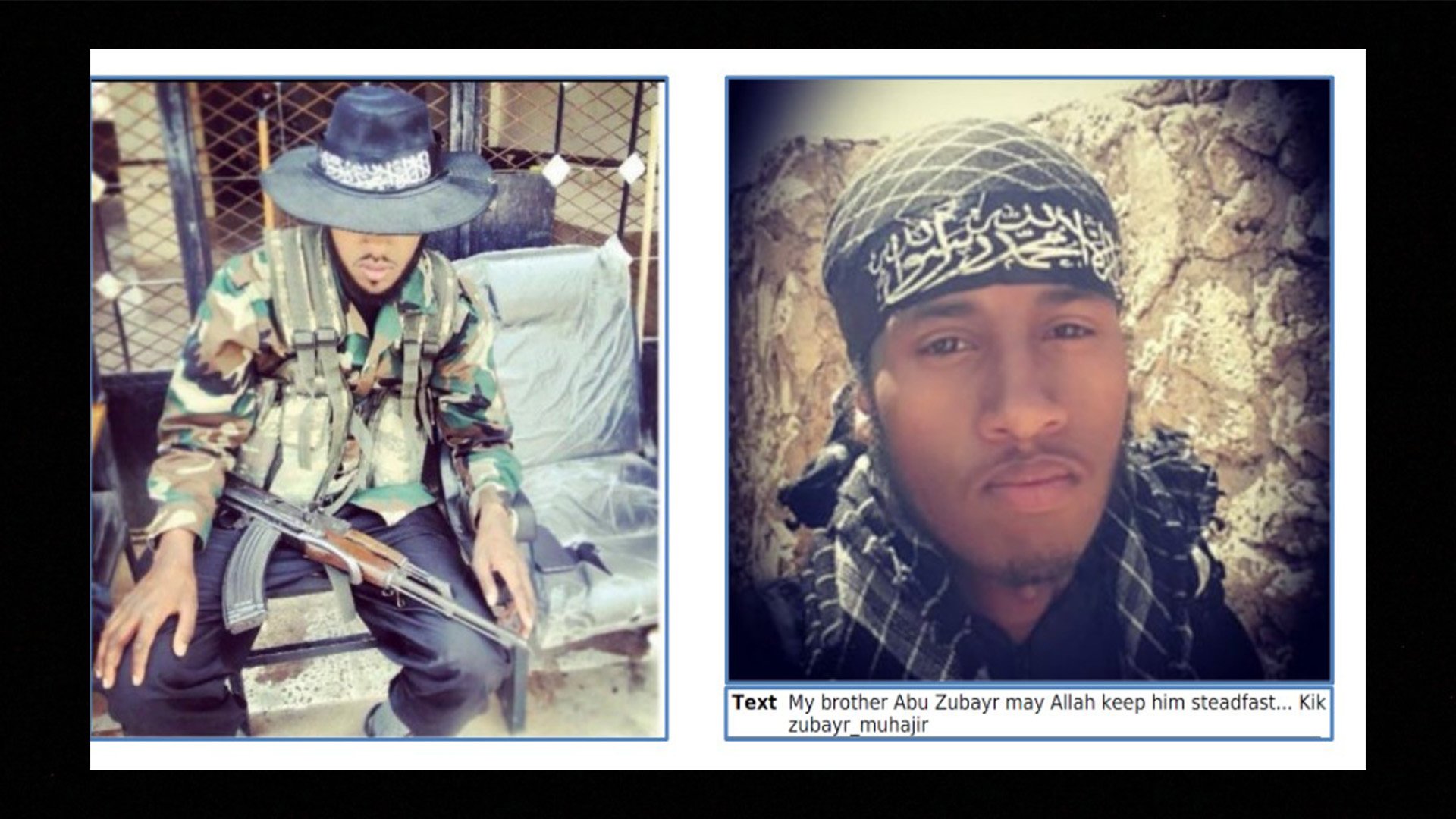
Social media posts captured Hamsa Kariye, 30 (left), and Hirsi Kariye, 23, before they were killed fighting for the Islamic State group in Syria. They were cousins of convicted terrorist financier Abdullahi Ahmed "Phish" Abdullahi, 37. US Department of Justice photo.
Canadian detectives and American agents interviewing relatives of Hamsa Kariye and Mahad Hirsi began to uncover the conspiracy in late 2014, according to court records.
And they later followed the money by reading Abdullahi’s draft emails and private Facebook messages to the men, who had been pipe fitters in Canada before they became militants.
The ring entered the FBI’s radar because Mohallim’s mother traveled to Turkey to try to woo her son to return to the US and then called the FBI to turn him in.
That sparked Abdullahi’s warnings to other co-conspirators that law enforcement might try to detain them in airports before they made it to the Middle East.
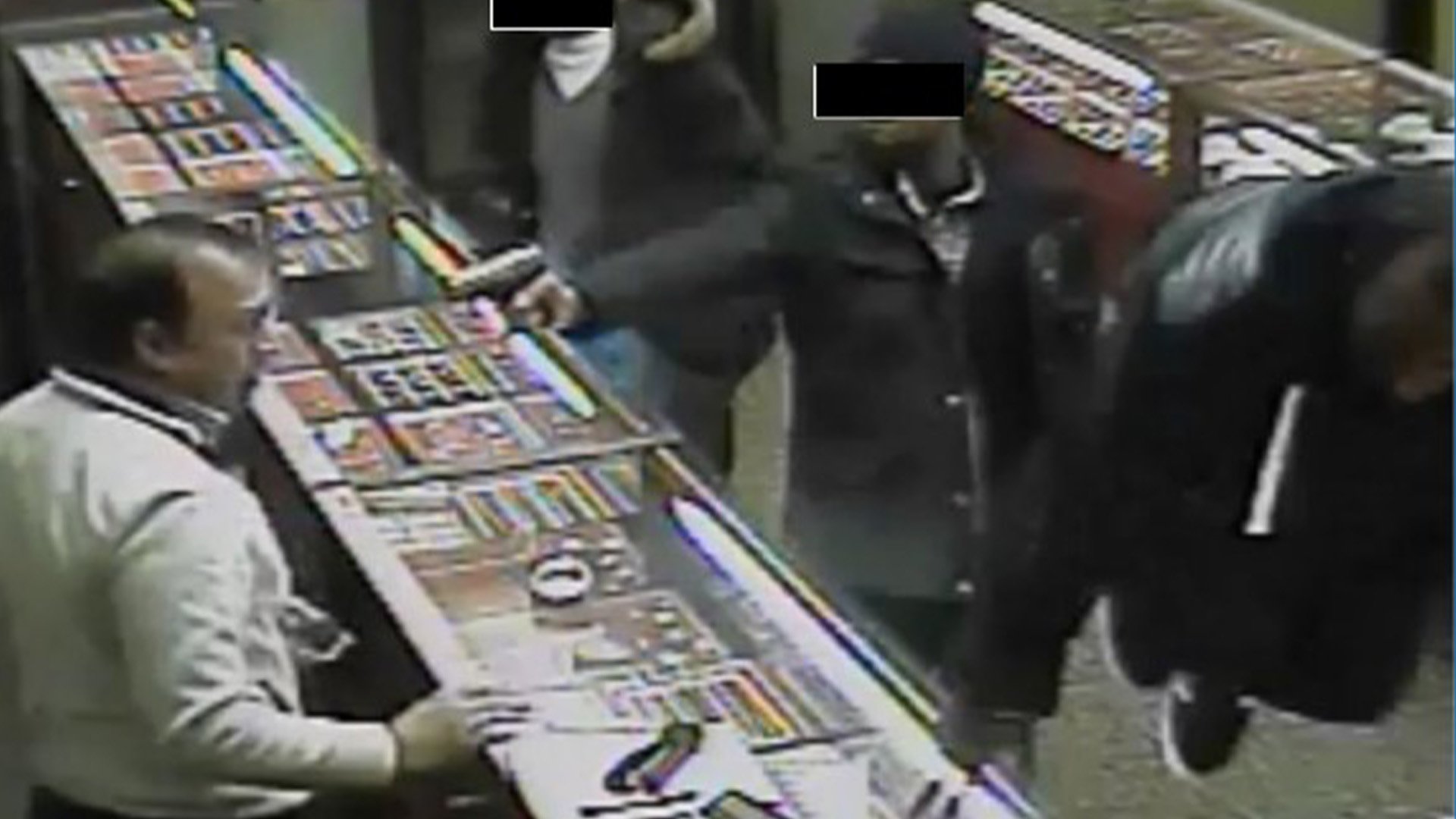
A security camera captured Abdullahi Ahmed "Phish" Abdullahi leaping over a counter to loot a jewelry store display case on Jan. 9, 2014, in Edmonton, Canada. US Department of Justice photo.
At the same time, detectives in Edmonton were trying to solve the brazen Jan. 9, 2014, heist of VJ Jewellers in Edmonton.
Orchestrated by Abdullahi to get money to fly McCain and Mohallim to Turkey, the brutal robbery injured a 64-year-old shop owner, who was flung to the floor, his head wrapped in a towel, to keep him from shouting for help.
Pinned to the ground by Abdullahi, the shop owner remembered one of the men telling him, “We could just kill you, but we don’t want to. Just keep quiet. Keep quiet!”
And when of the neighbors heard the shop owner screaming for help and approached, he was met by a henchman pointing a pistol at him.
“Just shoot him! Just shoot him!” yelled one of the robbers, shortly before Abdullahi and his accomplices fled the scene in a white minivan, just ahead of the police.
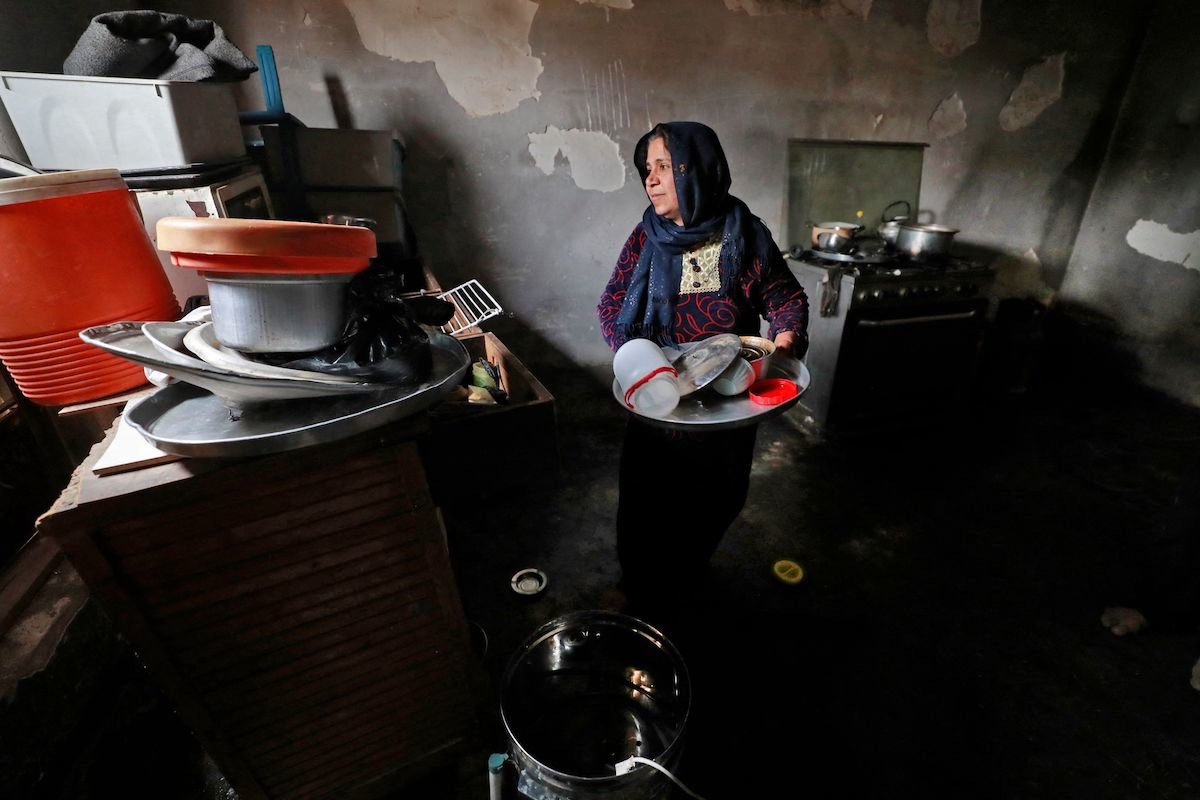
A woman works in the kitchen of her damaged house in the war-ravaged village of Habash, some 180 kilometers north of Iraq’s capital Baghdad, on April 25, 2022, eight years after heavy fighting between Islamic State group jihadists and the army ended. Photo by Ahmad Al-Rubaye/AFP via Getty Images.
Authorities estimated Abdullahi’s crew made off with up to $30,000 in jewelry he’d stuffed into a pillowcase. But in the wake of the highly publicized stickup, Phish struggled to pawn or fence the gems.
He ended up spending months trying to convert the jewelry to cash, ultimately getting pennies on the dollar for their value. It became a wrinkle in his larger plan to defraud and rob non-Muslims — people he slurred as “kuffar” — to finance jihadists at home and abroad.
But that bungled plot also was a departure from Abdullahi’s previous petty criminality.
Between 2002 and 2011, he faced misdemeanor charges for disorderly conduct; riot in the third degree; curfew violations; providing false information four times to police officers; unlawful carrying of a firearm; driving on a suspended license; disturbing the peace; public fighting; and resisting arrest.
But his rap sheet seemed to end in Canada, where he toiled as an oil rig worker and founded a nonprofit to help the growing Somali refugee community there.
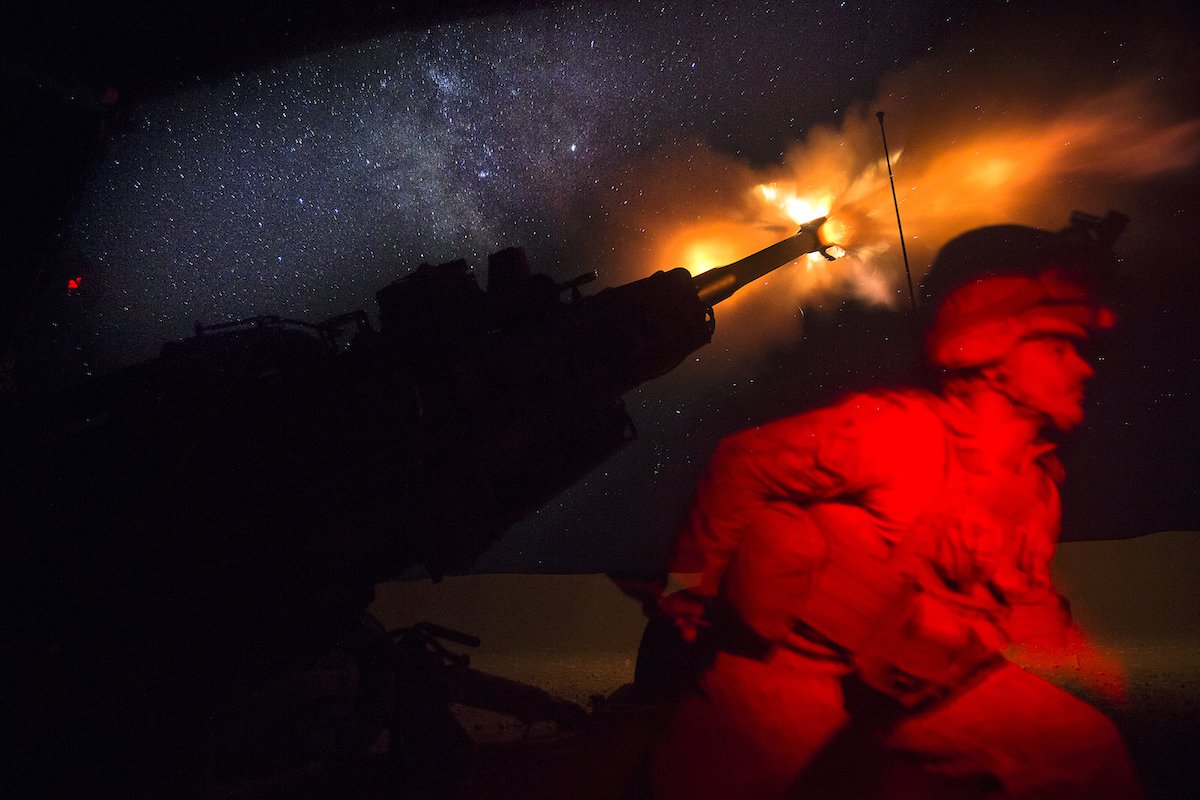
A US Marine fires an M777-A2 howitzer in the early morning in Syria, June 3, 2017, targeting elements of the Islamic State group. US Marine Corps photo by Sgt. Matthew Callahan.
Both prosecutors and defense attorneys settled on a 20-year sentence — a decade below the max — because Abdullahi’s radicalization waned as his cousins died on the battlefield, and he no longer believed in jihad by the time he pleaded guilty.
Letters penned by relatives to the judge also painted a complicated portrait of the man.
A cousin in Canada, Guled Kariye, recalled Abdullahi’s compassionate work with disabled people. He described Phish taking food left over from their stall at San Diego farmers markets to give to the homeless at Ocean Beach.
Another cousin in Minnesota, Hodan A. Dualeh, recollected Abdullahi stopping after rainstorms to pluck frogs and earthworms from the pavement so they wouldn’t be trampled.
But prosecutors weren’t fully convinced about Phish's humanitarian motives.
“The entirety of Abdullahi’s criminal conduct represents a unique and violent brand of criminality that simultaneously shows no respect for human life or the rule of law,” wrote Assistant US Attorneys Shane Harrigan and Fred Sheppard in a joint Oct. 6 memorandum to the judge. “He committed violent acts to support the violent terrorist activities of one of the most deadly and brutal terrorist organizations on this planet.”
Read Next: Tennessee Social Worker Snagged in FBI Anti-Terror Sting Stays Behind Bars

Carl Prine is a former senior editor at Coffee or Die Magazine. He has worked at Navy Times, The San Diego Union-Tribune, and Pittsburgh Tribune-Review. He served in the Marine Corps and the Pennsylvania Army National Guard. His awards include the Joseph Galloway Award for Distinguished Reporting on the military, a first prize from Investigative Reporters & Editors, and the Combat Infantryman Badge.
BRCC and Bad Moon Print Press team up for an exclusive, limited-edition T-shirt design!
BRCC partners with Team Room Design for an exclusive T-shirt release!
Thirty Seconds Out has partnered with BRCC for an exclusive shirt design invoking the God of Winter.
Lucas O'Hara of Grizzly Forge has teamed up with BRCC for a badass, exclusive Shirt Club T-shirt design featuring his most popular knife and tiomahawk.
Coffee or Die sits down with one of the graphic designers behind Black Rifle Coffee's signature look and vibe.
Biden will award the Medal of Honor to a Vietnam War Army helicopter pilot who risked his life to save a reconnaissance team from almost certain death.
Ever wonder how much Jack Mandaville would f*ck sh*t up if he went back in time? The American Revolution didn't even see him coming.
A nearly 200-year-old West Point time capsule that at first appeared to yield little more than dust contains hidden treasure, the US Military Academy said.












